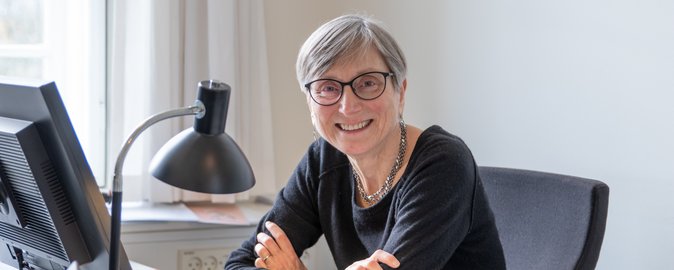- Education
-
Research
Current research
Talent
-
Collaboration
Businesses
Government agencies and institutions
Alumni
-
About AU
Organisation
Job at AU
Aarhus University's goal for both academic and social environments is to embrace all students. For this reason, Vice-dean for Education Lise Wogensen Bach is now placing greater focus on the inclusive social environment at Health. Among other things by ensuring that the students' social associations draw up a code of conduct for future social events.
2021.12.02 |

Vice-dean for Education Lise Wogensen Bach has asked the students' social associations to draw up a code of conduct for future social events. Photo: Simon Fischel, Health Kommunikation.
After a longer break due to the coronavirus, parties and other social events at the university are in full swing again, providing an opportunity to revisit how students meet and interact with each other both in day-to-day teaching and also at Friday Bars, parties and the like.
Vice-Dean for Education Lise Wogensen Bach will therefore have a dialogue with the students' social associations and ask them to draw up a code of conduct for future social events.
"In general, the students are really good at looking after each other. But it’s still a good idea for everyone, including the social associations, to take a step back and look at the kind of culture there is around parties and celebrations. Is it inclusive for everyone, or is there behaviour and comments that may be inappropriate?" asks Lise Wogensen Bach.
She explains that there have, unfortunately, been parties that have not been held in an appropriate manner. This has, among other things, led to a great deal of cleaning up afterwards, for example of rooms which have not – to put it mildly – been treated properly.
"Of course, we can't accept this as a faculty, and this is why I've contacted the associations and asked them to draw up a code of conduct for future parties,” explains Lise Wogensen Bach.
It is the social associations themselves who are responsible for drawing up a code of conduct, and these must include guidelines for e.g. when a party will finish, who is allowed to participate, and a guarantee that sober security guards will always be present.
Common understanding of good behaviour
Lise Wogensen Bach says that drawing up a code of conduct is not only intended to provide guidelines for social events in the future, but also to act as a catalyst for a discussion and awareness among the students of what they themselves consider to be an inclusive and safe study and social environment for everyone, and not least a common understanding of good behaviour.
"Clearly there needs to be space to be young and have fun while studying. But there’s a rule of thumb that says you mustn’t put others in a situation where they have to say no. This is true both when you’re in a lab coat, sitting in the reading room or standing at the bar. So therefore it’s not okay to make inappropriate comments about clothing, demand that someone must get drunk to join the social association, or allow parties and celebrations to escalate to a level where many of the participants no longer think it’s fun to be involved," explains Lise Wogensen Bach.
At the university, employees have a whistleblowing scheme, where it is possible to complain about inappropriate behaviour. This is not the case for the students. That is why she finds it important to have an ongoing dialogue with and among the students about the culture.
“Certain obligations follow from being an employee or student at Aarhus University. We are all representatives of the university, and this is still the case when we’re at our Christmas parties and Friday bars. And in a large organisation, we also have a shared responsibility to create a culture in which everyone can feel safe. What we tolerate is absorbed and suddenly becomes a permanent part of the culture and can easily become a slippery slope if we don’t regularly stop and take stock of the community that we are all members of. It’s clear that students and employees shouldn’t party together. And it’s also clear that students can’t talk about fellow students or what happened at a party in front of patients if they’re in the clinic. We just have to remember to remind ourselves of this from time to time, so that together we can create a safe and inclusive community across departments and degree programmes."
According to Lise Wogensen Bach, the ambition is to focus on how the students are welcomed, the kind of framework that there is, and what the faculty can vouch for as an institution. That is why it is important to have an ongoing dialogue with and among the students about the culture.
The individual social associations must present a draft of a code of conduct, and the goal is for all social associations at Health to ultimately draw up a common code of conduct. If the social associations fail to hold social events in accordance with the code of conduct, then ultimately it may mean that they lose financial support and access to premises at the university.
See also the university's guidelines for an inclusive study environment: Zero tolerance
Vice-dean for Education Lise Wogensen Bach
Aarhus University, Health
Mail: lwb@au.dk
Mobil: (+45) 25 48 85 22